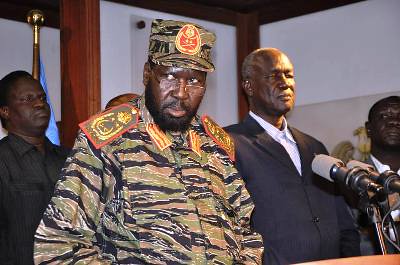
Republic South Sudan President Salva Kiir with Defense Minister Koul Manyang Juuk announcing that an attempted coup has taken place. He blamed former Vice President Riek Machar., a photo by Pan-African News Wire File Photos on Flickr.
SUNDAY 19 JANUARY 2014
S. Sudan’s President accepts cessation of hostilities agreement
January 19, 2014 (JUBA/ADDIS ABABA) - South Sudanese president Salva Kiir accepted on Saturday a cessation of hostilities agreement with rebels who have been fighting to remove him from power for over a month.
Under the terms of the draft deal, which the two sides immediately accepted, the fighters from both sides are expected to stop engaging in physical fighting, paving the way for further negotiations on how to resolve the crisis that started on December 15.
The Intergovernmental Authority on Development (IGAD) mediation team handed over a final draft agreement on a cessation of hostilities to the two sides on Friday evening, expecting them to respond on Saturday with either acceptance of the recommendation or rejection of the draft.
The breakthrough comes as the South Sudanese army announced on Saturday that it had recaptured Bor, the Jonglei state capital from rebels. Bor had been under control of the rebels for around three weeks after rebels regained control of the key town for the second time since the conflict began.
Following the army’s claim to have retaken Bor on Saturday, Juba’s negotiating team in the Ethiopian capital, Addis Ababa, told Sudan Tribune that the South Sudanese government is ready to sign ceasefire agreement within the next few days.
"We are now ready to sign agreement on cessation of hostilities if the rebel side is ready for similar commitment" a representative of the government, who asked for anonymity, said.
Yien Mathew Chol, an assistant spokesman for the rebel delegation in the Ethiopian capital of Addis Ababa, stated that the document includes four areas.
"First, there is provision for an immediate cessation of hostilities. Second, the agreement calls on the two parties to stop media campaigns and issuing propaganda statements against each other. Third, it calls for allowing humanitarian access to assist victims of the conflict. Fourth, it calls for the withdrawal of foreign troops from South Sudan. We therefore accepted the draft as the leadership of the negotiating team", he said.
Chol said the leadership of the rebel group immediately approved the document, because there were elements of objectivity in the draft by the mediators, claiming the two sides had accepted the deal.
The head of the government delegation, Nhial Deng Nhial, held consultations in Juba on Saturday with President Kiir in the presence of the information minister Michael Makuei and the president’s spokesman, Ateny Awek Ateny.
The team of IGAD mediators chaired by Ethiopian former foreign minister, Seyoum Mesfin, traveled to Juba on Thursday for further consultations with the South Sudan leader after peace talks between the two rivals continued to stall over issue of the 11 political prisoners who have been held since the start of the crisis.
Nhial confirmed that the government had agreed to the ceasefire, saying he expected it to be signed after his return to Addis Ababa. He said that the stipulation on the withdrawal of foreign forces was well received on their side, which encouraged them to agree to the deal.
Despite earlier denials, Kampala and Juba have now admitted that Ugandan forces have fought alongside the South Sudanese army (SPLA) in countering the rebellion.
The regional mediators were expected to return to Addis Ababa on Saturday to push the ceasefire agreement to be signed by the two parties and end over a month-old bloody fighting between the army and forces loyal to Kiir’s former deputy Riek Machar.
As government forces gain momentum - they also retook Bentiu, the capital of oil-producing Unity state, just over a week ago - some observers believe that a deal over the next few says has become more likely.
Direct talks continued in Addis Ababa on Saturday over a final draft proposal presented by IGAD mediators on a cessation of hostilities. Both sides have agreed on the final draft proposal but differences still exist over some of the wording in the final peace document.
If the two parties manage to sign truce they will then enter into dialogue on releasing the 11 pro-rebel political figures who remain detained on alleged accusations of links with last month’s fighting in Juba, which the government claims was a failed coup attempt.
After conflict within the military began in the capital it spread to Jonglei, Unity and Upper Nile states with significant sections of the army defecting.
The violence has claimed the lives of close to 10,000 people, according to the International Crisis Group (ICG), and forced half a million people to flee their homes.
The UN has accused both sides of committing war crimes and human right abuses.
The South Sudanese government on Saturday categorically denied allegations that its forces were involved in any crimes against civilians, despite reports to the contrary by groups such as Human Rights Watch.
(ST)
No comments:
Post a Comment